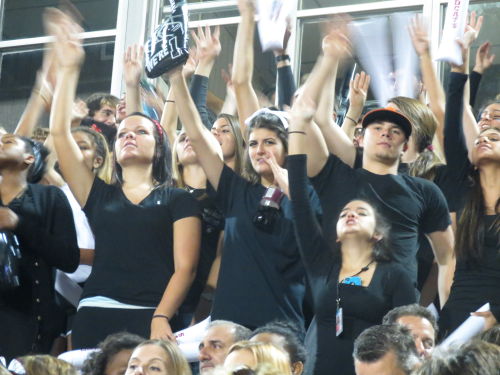
Wildcats say, ‘1 Heart, 1 Team’ through chaos
November 6, 2013
Take me out to the ball game: Cut Off gal goes to the ‘show’
November 6, 2013Parents and fans who say Destrehan High School should keep its disgraced assistant coaches for the sake of the team may be missing important basics regarding sportsmanship and the very game of football itself, if sports ethicists and philosophers interviewed this week are correct.
“Sports concerns the pursuit of virtue and honor,” said Michael Josephson, founder of the Joseph and Edna Josephson Institute of Ethics in Los Angeles. “What you find common in any sport is its rules. You score six points for this or two points for that. The rules define every sport … You play by the rules and if you do not it is called cheating.”
Whether a weighted bar, the taking of steroids or the unauthorized viewing of videos or look at the playbook of an opposing team, Josephson said, the outcome is the same.
“You have violated the most fundamental conditions of the sport,” Josephson said. “And then you are no longer engaging in the sport. You are no longer measuring what is the fastest or the strongest, it is something else because it is aided by cheating.”
In his ethics courses and workshops, Josephson said, a hypothetical situation is used. A coach before a very important game is presented with the playbook of the opponent with no indication of its source.
“What is he to do? He is not to open it or read it or use it,” Josephson said. “He had nothing to do with the taking of it, because that is an unfair advantage, it is not the sport anymore and that is wrong.”
Josephson and other ethicists noted that there are some built-in gray areas in various sports. A player or coach might observe the opposing team’s signals and utilize them to his team’s advantage, certainly.
“Stealing signals is part of the game but only if you can do it visually,” Josephson said. “That is considered fair because you, the other team, didn’t hide your signals well. That is part of the game.”
Suspicions of signal-stealing persisted for decades regaring the historic “shot heard round the world” home run hit by New York Giant Bobby Thompson, clinching the 1951 pennant for his team.
It is only within this century that the practice, accomplished with a well-placed telescope in the stands and a buzzer system, was confirmed, although Johnson has always maintained his homer was earned and not the result of any shenanigans.
In high school sports, Josephson said, the missions of teaching sportsmanship and fair play mandate a serious and non-emotional look at the situation.
“The game involves a certain amount of trying to figure out tactics and strategy, and it is part of the game to intimidate a little bit, or perhaps have a little bit of trash talk. At some point, however, you distort the game completely. Do we want to teach people that skill? The implication is if you do not punish it you sanction it, you make it part of the game.”
The most stern punishment possible would be appropriate, in Josephson’s view, perhaps suspension for a year or two for the coaches.
The actions of the coaches, he said, erode the credibility of the Wildcats’ winning record.
Every team, Josephson said, has a player like the disgruntled student who passed on the South Lafourche login information to the assistant coach at Destrehan.
“What makes you think this was the first time they did it?” Josephson said. “It is totally unspeakable espionage, outrageous in high school sports, and frankly the team should not be allowed to win any championships this year.”
Josephson also questioned how Destrehan head coach Stephen Robicheaux was in the dark, as he has claimed.
“It is hard for me to understand how they could be doing all this and trying to affect plays and the head coach not know anything,” Josephson said.
Bill Kelley, a Yale University ethicist, agrees that the actions are wrong. But the gray areas in sports must also be recognized, he said.
“How bad is this kind of spying? On the one hand sports is one of the few places in life where you have got a rule book. There are three strikes not four. There is a book that says what is fair and foul. But the playbook is how we get around the rule book strategy, how we use deception.”
Shawn Klein, of Rockford University’s sports ethics center in Illinois, also questions how Robicheaux could have been clueless.
“You would think you are the head of the ship you should know what is going on,” Klein said. “The other coaches could have kept it from him, he might not even think about where it had come from. Unless a guy has a good idea and all his other ideas have not been good. Maybe the coach was incompetent in that regard.”
Klein said letting behavior such as that alleged against the Destrehan coaches sends a totally wrong message.
“That says it is okay to break the rules of your sport, to even engage in illegal activities,” he said, adding that it is understandable how some in Destrehan might wish to look the other way.
“But you don’t want that to go far,” he said. “There is a line that you have to draw. You can forgive, but you must also draw the line because otherwise all the good you have done as a coach, as a team, can be lost.”










